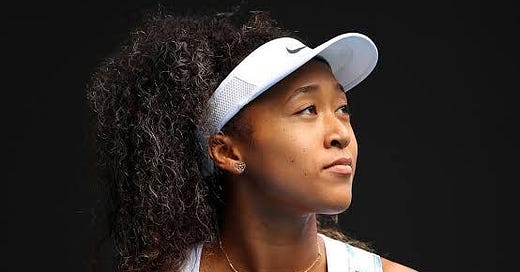There is a lot to be excited about ahead of Wednesday’s first Test between the West Indies and South Africa at the Darren Sammy Stadium in St.Lucia but one thing is certain – no players on either team will be refusing to speak to the media.
Naomi Osaka’s decision to blank the obligatory press conferences during the French Open at Roland Garros has been vexing me all week. She was duly fined after her first round victory, as she knew she would be, and subsequently withdrew from the tournament.
Only once in 30 years have I taken umbrage at being snubbed by a sportsman, and that was because it cost me. Otherwise I’ve always felt that it is their right to choose whether to speak or not. While conducting numerous ‘media awareness’ courses for young sports people over the years I’ve always emphasised the importance and value to their careers of being able to engage effectively during an interview or press conference. Not being able to do so almost invariably costs them more than it does the media.
At the 1992 Million Dollar challenge at Sun City the organisers hired high-profile American rules official, Buddy Young, as tournament director. He duly generated headlines – although not of the sort the organisers were hoping for – by disqualifying the co-leader, Nick Price, and Open champion Nick Faldo after the third round. Price’s caddy had innocently moved an advertising hoarding during the round which Buddy deemed worthy of a two-shot penalty and Price did not, so he refused to sign his card. Faldo had inadvertently signed for an incorrect score after playing partner Bernard Langer marked a ‘4’ on the 18th rather than a bogey 5.
I was reporting the tournament for the BBC and they naturally asked me to get a short comment from Faldo. Price was not only happy to oblige, he virtually organised his own press-conference to tell his side of the story and protest his innocence having assumed that the normal ‘line of sight’ rules applied to temporary, movable objects rather than permanent obstructions. Everyone, it must be said, apart from Buddy, saw it the same way.
Faldo, however, stormed towards the hotel to pack his bags and leave as soon as possible. He snarled what could have been a mild obscenity at me when I asked for a comment – “just one sentence will be fine, please?” The BBC had promised me an extra £50 which, back then, was the difference between breaking even and turning a small profit for the week in the early years of my freelance career.
Adrenalin took over and I pursued Faldo, shaking. “Mr Faldo, you get paid 10,000 times what I’ll get for this interview…and you can’t give me 30 seconds of your time?” He stopped, glared at me, pondered, and said: “Go on then, 30 seconds…”
In the late 90s a prominent South African cricketer misunderstood something I had said or written and vowed never to speak to me again. Rather than an inconvenience, it was a blessing. Never again did I have to tolerate his surliness. It was liberating. As I have told many young sports people, in the absence of an explanation observers have little option but to draw their own conclusions.
Press conferences can be tedious and repetitive. They can also be intimidating and sometimes excruciatingly awkward. They are almost always inconvenient, invariably last too long and always contain questions which are inane and/or irrelevant. And there are always members of the media for whom the opportunity to speak – often with statements rather than questions – cannot be passed up.
When Osaka declared her intention to skip them all, no matter how she played, my first instinct was to offer a knowing grin. The only reservation was her reasoning that the ‘negative criticism of her game’ wasn’t good for her mental health. If she’d cited the ridiculousness of the questions or the fact that press conferences sometimes take place at absurd times of the night, I’d have fully agreed. But criticism of her second serve or sliced back-hand, no matter how ill-informed, has to be tolerated.
The problem for event organisers is their duty to sponsors who receive valuable airtime while the players are on air and in vision. If mandatory public appearances were made voluntary, the fear is that the biggest names (and bank balances) would be the most likely to skip them. The contestants making their way up the ladder, if properly media-coached, would be keen to use the secondary stage on which to perform, the one provided by the media. As I tell my students: “Unfortunately, media people have absolutely no effect on how much they get paid – but they might just have an effect on what you get paid. If you can’t bring yourself to get on with them, at least make their jobs easier.”
Osaka is only 22-years-old and has been brave enough to talk about having mental health challenges. At times in her short but bright career she has looked and sounded bored, disinterested and even disrespectful. Anybody with first-hand, or even second-hand knowledge of depression will know the signs. All she was asking before the tournament was that media protocols are re-examined. They have been done the same way for too long.
A fresh look, with an open mind, is not just the least Osaka deserves, it’s what all sport deserves – on a regular basis.
Thank you so to everyone who has shown their appreciation of my work and this column through Buy Me a Coffee . I am entirely freelance but have no intention of going down the exclusively ‘paid subscription’ route.
Please encourage anyone you think may be interested in columns like this to subscribe.






Thanks Neil - yet another interesting one and I love the analogies. However - (there is aways a "but" or "however") as I recall, Osaka simply made a statement to the Press (there is some irony in that) that she was imposing a ban on all press conferences for reasons amongst others (fielding aweward and sometimes senselss questions) mental health and it was not apparent in that release that she in fact had some mental health issues and it goes without saying that under those circumstances, exceptions can be made.
I believe that she should rather have met with the tournament organisers privately, come to an agreement and then the organisers could have released a statement exempting her from press releases (as I am sure once explained there would be some showing on compassion and empathy).
My point is - nothing wrong with the reason - but in my opinion a lot wrong in the manner in which she chose to notify the world.
In general, why should the media always be vilified for doing their jobs....could it be done better - yes - but a presser is needed to avoid many other issues arising should there not be one and to stop the rumour mongering etc....it unfortunately does come with the Job - I am sure that when a tournament is won all the players them love the attention (and the money - lets not forget the money and where it comes from) and the opportunities for the players get from the tournaments to earn pots and pots of it...no complaints there....
So in my opinion - the mental health issues must be dealt with - but let the organizers know - so they to can deal with the fall out. If they don't know you are ill, then how the hell do you expect them to deal with it?
What is in dispute is contract law, all players, organizers, anyone involved signs a contract that lists what can and cannot be done, what is expected, and what sanctions there are if anyone breaks the contract...
What the issue is here, Naomi and others have had bad legal advice, the person/s they are paying ie agents are not worth bog rolls, they negotiated in bad faith, bad faith for the clients, what should happen is that before you sign, you negotiate, Naomi could have negotiated a new contract for 2021/2022 season for example, it is not likely she woke up on Monday and felt that her mental health was in disorder.. She has felt like this for a long time..
That is why we have courts, lawyers, to fight this, anyone has the right to re-negotiate a contract if the circumstance changes, sure it is expensive, no doubt Ms Osaka can afford to fight this, it is almost a class action case, that involves not only the WTA, but all athletes, players, anyone that provides entertainment dressed in sportswear...
What she did was right for the wrong reasons, she should have done the interview, then fought for her mental health off the court, the tennis court, and involved her legal team.. Not unlike what Caster is doing, sure it is her case, but the case sets precedence, which is right and totally cool!!!
The WTA, ATP, ICC, WR, IOC, etc have created a situation that is now a mindfield, players are coming to realize that actually they have powers, and are starting to use this power, sadly wity very bad advice from the legal beagles.. It is said that many F1 ace's have written into the contract a get out clause that says if the team do not do x or y, and the driver has less than x points, there is a termination clause..
What I don't get is there is no Players Contract Committee in tennis, soccer, as there is in F1, all F1 contracts have to be ratified by the F1 contract committee, this committee consists of ex drivers, lawyers, agents that represent all parties, FIA, team owners, etc..This seems to work very well, however it is structured..
Players should no longer just accept the way it was, just look at the Sri Lanka cricket team, they refused a contract based on an insane system.. They felt that was wrong.. Law courts are the right forum, not the media, it just makes the player look like they are having a toddler's tantrum...
I only realized this when I was involved in a case, I went to the media, the story was published and I was abused in the comments, it was after this I found a great law firm, and they took on my case, on 1 condition, no media.. Not even when we won.. Nothing.. That was great advice..
Players should be able to speak their minds, without fear or favour, if not then you know they are just saying garbage, as they fear reprisal, if they cannot speak open and from the heart, then why do we have press conferences if going in you know the answers are fake.. It is a total waste of time.. I no longer listen to post event interviews, as there is always some overpaid PR manager making sure Mr or Ms Athlete stays on script, often taping the interview.. Why bother as the answers are staged and fake!!!